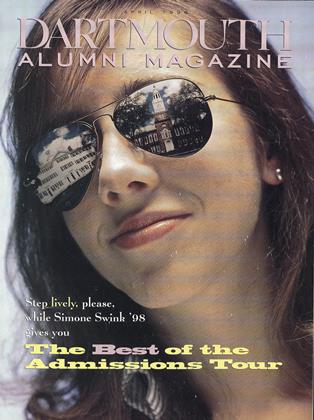One rarely gets the chance to wrap his innermost life into a tidy bundle. President James O. Yeedman had that: opportunity last year, when his sabbatical coincided withe an enforced period of recovery from chemotherapy. I he outcome is a new book. published by the University of Michigan Press: Idealism andLiberal Education.
Its chapters are an orderly compilation of Freedman's speeches and essays (many of which have appeared on the pages of this magazine). He adds a host of reflections on a life spent in the company of books. His is the mind of an intellectual, destined almost from boyhood to become an educator—one who can't resist embellishing his own observations with relevant statements by others. He quotes Mae West as felicitously as he quotes Jefferson, Keats, and Schopenhauer.
Freedman relates each course of study to the ultimate goal, a liberal education. Science imposes order on our lives. Teaching nurtures those whose ideas will one day displace our own. Law inculcates the responsibilities of thought and action. And as any Dartmouth student of the past ten years is well aware, a foremost Freedman enthusiasm is for "mentors,"' those men and women whose "exemplary lives matter" as models for our own. '
Now the longest-serving Ivy president, he says that in his inaugural address (the one that asked tor more "creative loners and daring dreamers"), the diirectness with which I initially set forth my vision has, I believe, served to move Dartmouth forward more effectively than more measured language would have done." Presidents usually don't have that luxury he notes, for "although presidents may draff their own public statements. they dare not issue them until they have been approved by dozens of colleagues sensitive to the concern of the university's various constituencies....Any element of personal style that may have lent grace or lucidity to the first draft is rooted out."
The reader will be grateful that not too many colleagues got their hands on any draft of this most readable book.
 View Full Issue
View Full Issue
More From This Issue
-
 Feature
FeatureSquare Legs ON THE GREEN
April 1996 By ROBERTO PARADA -
 Cover Story
Cover StoryWe asked Simone Swink '98, a student guide, to give us a short version of her spiel io visifors. Step lively, please, Any questions?
April 1996 -
 Feature
FeaturePOETS
April 1996 By Jim Schley '79 -
 Article
ArticleThe Dean Hopes for Sober Places
April 1996 By "E. WHEELOCK" -
 Article
ArticleTV Guy
April 1996 By Karen Kndicott -
 Article
ArticleOh, Professor, No Charge for You
April 1996 By Noel Perrin
Article
-
 Article
ArticleTHE announcement
JUNE, 1907 -
 Article
ArticleTHE PLAYERS
December 1921 -
 Article
Article1800 DARTMOUTH SIGNERS TO WORLD COURT PETITION
August, 1923 -
 Article
ArticleHISTORY THAT WON'T FLY
May 1995 By Karen Endicott -
 Article
ArticleCollege to Host Symposium
APRIL 1986 By L.T.H. -
 Article
ArticleThe Faculty
APRIL 1969 By WILLIAM R. MEYER

